Overview -
Contoso, Ltd. is a private corporation that has 2,000 employees.
The company has a main office and several branch offices. The main office is located in Houston. The branch offices are located throughout the United States.
Each office has a reliable and fast Internet connection.
Existing Environment -
Active Directory -
The network contains one production Active Directory forest named contoso.com and one test Active Directory forest named test.contoso.com. All servers run
Windows Server 2012 R2.
Existing Infrastructure -
The company has a production network and a test network, which are isolated from one another. The production network contains 2,000 client computers. The test network contains 50 client computers. The client computers on both networks run either Windows 7 Pro, Windows 8 Enterprise, or Windows 8.1 Enterprise.
The production network includes the following:
The Key Management Service (KMS)
Two domain controllers in each office
Microsoft System Center 2012 R2 Orchestrator
Microsoft System Center 2012 R2 Configuration Manager
A member server named Server1 that is located in the main office
Two DHCP servers that lease IP addresses from the 10.10.0.0/16 address space and are configured for failover
The test network includes following:
Two domain controllers
The User State Migration Tool (USMT)
The Microsoft Deployment Toolkit (MDT)
A DHCP server that leases IP addresses from the 10.12.0.0/16 address space
A member server named Server2 that has the Windows Deployment Services server role installed
The Microsoft Assessment and Planning (MAP) Toolkit that is configured to have an existing inventory database
An application named App1 is deployed to the client computers on the test network. All of the client computers on the test network have an Application
Compatibility Manager (ACM) runtime-analysis package installed.
Zero Touch Installation (ZTI) is used on the production network. Lite Touch Installation (LTI) is used on the test network. The client computers on the test network are deployed from Server2. An image named Image1 in an image group named Group1 is used for the deployment of client computers.
The client computers on the production network are activated by using either Active Directory-Based Activation (ADBA) or KMS.
The company has kiosk computers that run Windows 8.1 Enterprise. The kiosk computers are located on an isolated network segment that has access to the
Internet only. The kiosk computers are configured to have a static IP address and to use an external DNS server. All of the kiosk computers use drive letter F for removable media devices. The computers are reinstalled every six months. Currently, the installation is performed manually.
Problem Statements -
Contoso identifies the following issues on the network:
An administrator fails to deploy a set of new client computers to the production network by using a Zero Touch deployment. The administrator receives an error message indicating that there is a missing network card driver.
App1 fails to run on Windows 8.1 Enterprise computers.
Requirements -
Planned Changes -
Contoso plans to implement the following changes to the network:
Create a training network. The training network will use a separate segment on the test network and will use the 172.16.10.0/24 address space. The client computers on the training network will be deployed by using Windows Deployment Services (WDS).
Upgrade the client computers that run Windows 7 and Windows 8 Enterprise to Windows 8.1 Enterprise.
Deploy App1 to all of the client computers.
Technical Requirements -
Contoso identifies the following technical requirements:
From Server1, Windows 8.1 Enterprise must be deployed to the client computers in the main office.
LTI of the client computers on the test network must start when five client computers are ready to be deployed.
LTI of the kiosk computers must be performed by using removable media, and the kiosk computers must be activated.
The User Driven Installation Replace Task Sequence template must be used when creating task sequences to upgrade the Windows client computers on the production network.
All of the user state data that is stored on servers during a computer upgrade must be encrypted.
You need to recommend which services must be deployed to the training network for the operation system deployment.
What should you include in the recommendation?
- A. MDT
- B. a DHCP relay agent
- C. an IP Address Management (IPAM) server
- D. a Configuration Manager site server
Answer : B
References:
https://technet.microsoft.com/pt-pt/library/cc780760(v=ws.10).aspx
Overview -
Contoso, Ltd. is a private corporation that has 2,000 employees.
The company has a main office and several branch offices. The main office is located in Houston. The branch offices are located throughout the United States.
Each office has a reliable and fast Internet connection.
Existing Environment -
Active Directory -
The network contains one production Active Directory forest named contoso.com and one test Active Directory forest named test.contoso.com. All servers run
Windows Server 2012 R2.
Existing Infrastructure -
The company has a production network and a test network, which are isolated from one another. The production network contains 2,000 client computers. The test network contains 50 client computers. The client computers on both networks run either Windows 7 Pro, Windows 8 Enterprise, or Windows 8.1 Enterprise.
The production network includes the following:
The Key Management Service (KMS)
Two domain controllers in each office
Microsoft System Center 2012 R2 Orchestrator
Microsoft System Center 2012 R2 Configuration Manager
A member server named Server1 that is located in the main office
Two DHCP servers that lease IP addresses from the 10.10.0.0/16 address space and are configured for failover
The test network includes following:
Two domain controllers
The User State Migration Tool (USMT)
The Microsoft Deployment Toolkit (MDT)
A DHCP server that leases IP addresses from the 10.12.0.0/16 address space
A member server named Server2 that has the Windows Deployment Services server role installed
The Microsoft Assessment and Planning (MAP) Toolkit that is configured to have an existing inventory database
An application named App1 is deployed to the client computers on the test network. All of the client computers on the test network have an Application
Compatibility Manager (ACM) runtime-analysis package installed.
Zero Touch Installation (ZTI) is used on the production network. Lite Touch Installation (LTI) is used on the test network. The client computers on the test network are deployed from Server2. An image named Image1 in an image group named Group1 is used for the deployment of client computers.
The client computers on the production network are activated by using either Active Directory-Based Activation (ADBA) or KMS.
The company has kiosk computers that run Windows 8.1 Enterprise. The kiosk computers are located on an isolated network segment that has access to the
Internet only. The kiosk computers are configured to have a static IP address and to use an external DNS server. All of the kiosk computers use drive letter F for removable media devices. The computers are reinstalled every six months. Currently, the installation is performed manually.
Problem Statements -
Contoso identifies the following issues on the network:
An administrator fails to deploy a set of new client computers to the production network by using a Zero Touch deployment. The administrator receives an error message indicating that there is a missing network card driver.
App1 fails to run on Windows 8.1 Enterprise computers.
Requirements -
Planned Changes -
Contoso plans to implement the following changes to the network:
Create a training network. The training network will use a separate segment on the test network and will use the 172.16.10.0/24 address space. The client computers on the training network will be deployed by using Windows Deployment Services (WDS).
Upgrade the client computers that run Windows 7 and Windows 8 Enterprise to Windows 8.1 Enterprise.
Deploy App1 to all of the client computers.
Technical Requirements -
Contoso identifies the following technical requirements:
From Server1, Windows 8.1 Enterprise must be deployed to the client computers in the main office.
LTI of the client computers on the test network must start when five client computers are ready to be deployed.
LTI of the kiosk computers must be performed by using removable media, and the kiosk computers must be activated.
The User Driven Installation Replace Task Sequence template must be used when creating task sequences to upgrade the Windows client computers on the production network.
All of the user state data that is stored on servers during a computer upgrade must be encrypted.
You need to recommend a solution for activating the kiosk computers.
What should you include in the recommendation?
- A. Create a reference image that has a Multiple Activation Key (MAK) located in C:\License.txt.
- B. Create an image of an activated reference computer.
- C. In an answer file, specify a Generic Volume Licensing Key (GVLK).
- D. In an answer file, specify a Multiple Activation Key (MAK).
Answer : D
Overview -
Contoso, Ltd. is a private corporation that has 2,000 employees.
The company has a main office and several branch offices. The main office is located in Houston. The branch offices are located throughout the United States.
Each office has a reliable and fast Internet connection.
Existing Environment -
Active Directory -
The network contains one production Active Directory forest named contoso.com and one test Active Directory forest named test.contoso.com. All servers run
Windows Server 2012 R2.
Existing Infrastructure -
The company has a production network and a test network, which are isolated from one another. The production network contains 2,000 client computers. The test network contains 50 client computers. The client computers on both networks run either Windows 7 Pro, Windows 8 Enterprise, or Windows 8.1 Enterprise.
The production network includes the following:
The Key Management Service (KMS)
Two domain controllers in each office
Microsoft System Center 2012 R2 Orchestrator
Microsoft System Center 2012 R2 Configuration Manager
A member server named Server1 that is located in the main office
Two DHCP servers that lease IP addresses from the 10.10.0.0/16 address space and are configured for failover
The test network includes following:
Two domain controllers
The User State Migration Tool (USMT)
The Microsoft Deployment Toolkit (MDT)
A DHCP server that leases IP addresses from the 10.12.0.0/16 address space
A member server named Server2 that has the Windows Deployment Services server role installed
The Microsoft Assessment and Planning (MAP) Toolkit that is configured to have an existing inventory database
An application named App1 is deployed to the client computers on the test network. All of the client computers on the test network have an Application
Compatibility Manager (ACM) runtime-analysis package installed.
Zero Touch Installation (ZTI) is used on the production network. Lite Touch Installation (LTI) is used on the test network. The client computers on the test network are deployed from Server2. An image named Image1 in an image group named Group1 is used for the deployment of client computers.
The client computers on the production network are activated by using either Active Directory-Based Activation (ADBA) or KMS.
The company has kiosk computers that run Windows 8.1 Enterprise. The kiosk computers are located on an isolated network segment that has access to the
Internet only. The kiosk computers are configured to have a static IP address and to use an external DNS server. All of the kiosk computers use drive letter F for removable media devices. The computers are reinstalled every six months. Currently, the installation is performed manually.
Problem Statements -
Contoso identifies the following issues on the network:
An administrator fails to deploy a set of new client computers to the production network by using a Zero Touch deployment. The administrator receives an error message indicating that there is a missing network card driver.
App1 fails to run on Windows 8.1 Enterprise computers.
Requirements -
Planned Changes -
Contoso plans to implement the following changes to the network:
Create a training network. The training network will use a separate segment on the test network and will use the 172.16.10.0/24 address space. The client computers on the training network will be deployed by using Windows Deployment Services (WDS).
Upgrade the client computers that run Windows 7 and Windows 8 Enterprise to Windows 8.1 Enterprise.
Deploy App1 to all of the client computers.
Technical Requirements -
Contoso identifies the following technical requirements:
From Server1, Windows 8.1 Enterprise must be deployed to the client computers in the main office.
LTI of the client computers on the test network must start when five client computers are ready to be deployed.
LTI of the kiosk computers must be performed by using removable media, and the kiosk computers must be activated.
The User Driven Installation Replace Task Sequence template must be used when creating task sequences to upgrade the Windows client computers on the production network.
All of the user state data that is stored on servers during a computer upgrade must be encrypted.
DRAG DROP -
You need to identify which issue prevents App1 from running.
Which four actions should you perform in sequence? To answer, move the appropriate actions from the list of actions to the answer area and arrange them in the correct order.
Select and Place:
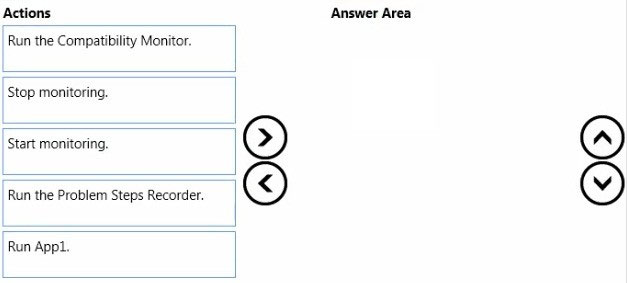
Answer :
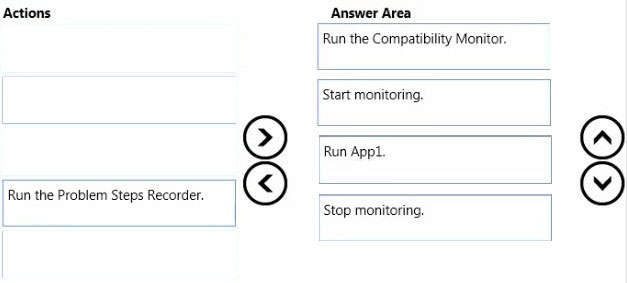
References:
https://technet.microsoft.com/en-us/library/hh825140.aspx
Overview -
Contoso, Ltd. is a private corporation that has 2,000 employees.
The company has a main office and several branch offices. The main office is located in Houston. The branch offices are located throughout the United States.
Each office has a reliable and fast Internet connection.
Existing Environment -
Active Directory -
The network contains one production Active Directory forest named contoso.com and one test Active Directory forest named test.contoso.com. All servers run
Windows Server 2012 R2.
Existing Infrastructure -
The company has a production network and a test network, which are isolated from one another. The production network contains 2,000 client computers. The test network contains 50 client computers. The client computers on both networks run either Windows 7 Pro, Windows 8 Enterprise, or Windows 8.1 Enterprise.
The production network includes the following:
The Key Management Service (KMS)
Two domain controllers in each office
Microsoft System Center 2012 R2 Orchestrator
Microsoft System Center 2012 R2 Configuration Manager
A member server named Server1 that is located in the main office
Two DHCP servers that lease IP addresses from the 10.10.0.0/16 address space and are configured for failover
The test network includes following:
Two domain controllers
The User State Migration Tool (USMT)
The Microsoft Deployment Toolkit (MDT)
A DHCP server that leases IP addresses from the 10.12.0.0/16 address space
A member server named Server2 that has the Windows Deployment Services server role installed
The Microsoft Assessment and Planning (MAP) Toolkit that is configured to have an existing inventory database
An application named App1 is deployed to the client computers on the test network. All of the client computers on the test network have an Application
Compatibility Manager (ACM) runtime-analysis package installed.
Zero Touch Installation (ZTI) is used on the production network. Lite Touch Installation (LTI) is used on the test network. The client computers on the test network are deployed from Server2. An image named Image1 in an image group named Group1 is used for the deployment of client computers.
The client computers on the production network are activated by using either Active Directory-Based Activation (ADBA) or KMS.
The company has kiosk computers that run Windows 8.1 Enterprise. The kiosk computers are located on an isolated network segment that has access to the
Internet only. The kiosk computers are configured to have a static IP address and to use an external DNS server. All of the kiosk computers use drive letter F for removable media devices. The computers are reinstalled every six months. Currently, the installation is performed manually.
Problem Statements -
Contoso identifies the following issues on the network:
An administrator fails to deploy a set of new client computers to the production network by using a Zero Touch deployment. The administrator receives an error message indicating that there is a missing network card driver.
App1 fails to run on Windows 8.1 Enterprise computers.
Requirements -
Planned Changes -
Contoso plans to implement the following changes to the network:
Create a training network. The training network will use a separate segment on the test network and will use the 172.16.10.0/24 address space. The client computers on the training network will be deployed by using Windows Deployment Services (WDS).
Upgrade the client computers that run Windows 7 and Windows 8 Enterprise to Windows 8.1 Enterprise.
Deploy App1 to all of the client computers.
Technical Requirements -
Contoso identifies the following technical requirements:
From Server1, Windows 8.1 Enterprise must be deployed to the client computers in the main office.
LTI of the client computers on the test network must start when five client computers are ready to be deployed.
LTI of the kiosk computers must be performed by using removable media, and the kiosk computers must be activated.
The User Driven Installation Replace Task Sequence template must be used when creating task sequences to upgrade the Windows client computers on the production network.
All of the user state data that is stored on servers during a computer upgrade must be encrypted.
DRAG DROP -
You need to resolve the Zero Touch deployment issue.
Which three actions should you perform in sequence? To answer, move the appropriate actions from the list of actions to the answer area and arrange them in the correct order.
Select and Place:
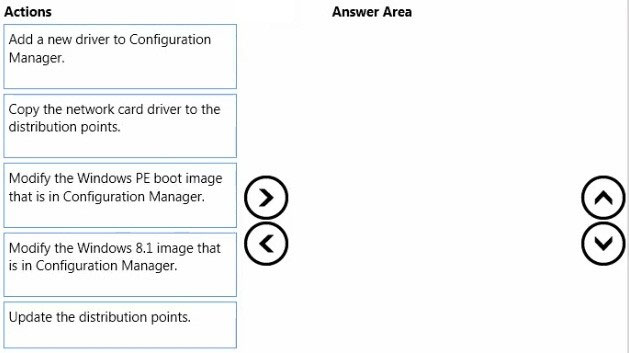
Answer :
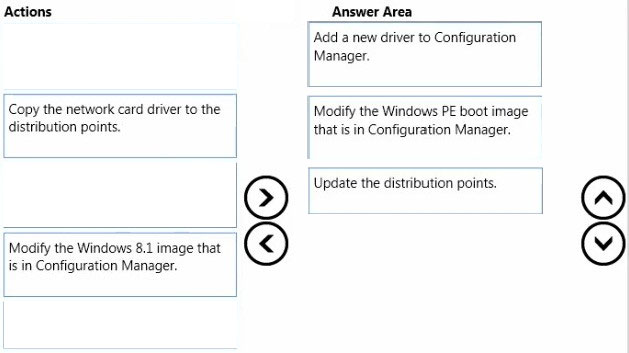
References:
https://technet.microsoft.com/en-us/library/bb680705.aspx
Overview -
Contoso, Ltd. is a private corporation that has 2,000 employees.
The company has a main office and several branch offices. The main office is located in Houston. The branch offices are located throughout the United States.
Each office has a reliable and fast Internet connection.
Existing Environment -
Active Directory -
The network contains one production Active Directory forest named contoso.com and one test Active Directory forest named test.contoso.com. All servers run
Windows Server 2012 R2.
Existing Infrastructure -
The company has a production network and a test network, which are isolated from one another. The production network contains 2,000 client computers. The test network contains 50 client computers. The client computers on both networks run either Windows 7 Pro, Windows 8 Enterprise, or Windows 8.1 Enterprise.
The production network includes the following:
The Key Management Service (KMS)
Two domain controllers in each office
Microsoft System Center 2012 R2 Orchestrator
Microsoft System Center 2012 R2 Configuration Manager
A member server named Server1 that is located in the main office
Two DHCP servers that lease IP addresses from the 10.10.0.0/16 address space and are configured for failover
The test network includes following:
Two domain controllers
The User State Migration Tool (USMT)
The Microsoft Deployment Toolkit (MDT)
A DHCP server that leases IP addresses from the 10.12.0.0/16 address space
A member server named Server2 that has the Windows Deployment Services server role installed
The Microsoft Assessment and Planning (MAP) Toolkit that is configured to have an existing inventory database
An application named App1 is deployed to the client computers on the test network. All of the client computers on the test network have an Application
Compatibility Manager (ACM) runtime-analysis package installed.
Zero Touch Installation (ZTI) is used on the production network. Lite Touch Installation (LTI) is used on the test network. The client computers on the test network are deployed from Server2. An image named Image1 in an image group named Group1 is used for the deployment of client computers.
The client computers on the production network are activated by using either Active Directory-Based Activation (ADBA) or KMS.
The company has kiosk computers that run Windows 8.1 Enterprise. The kiosk computers are located on an isolated network segment that has access to the
Internet only. The kiosk computers are configured to have a static IP address and to use an external DNS server. All of the kiosk computers use drive letter F for removable media devices. The computers are reinstalled every six months. Currently, the installation is performed manually.
Problem Statements -
Contoso identifies the following issues on the network:
An administrator fails to deploy a set of new client computers to the production network by using a Zero Touch deployment. The administrator receives an error message indicating that there is a missing network card driver.
App1 fails to run on Windows 8.1 Enterprise computers.
Requirements -
Planned Changes -
Contoso plans to implement the following changes to the network:
Create a training network. The training network will use a separate segment on the test network and will use the 172.16.10.0/24 address space. The client computers on the training network will be deployed by using Windows Deployment Services (WDS).
Upgrade the client computers that run Windows 7 and Windows 8 Enterprise to Windows 8.1 Enterprise.
Deploy App1 to all of the client computers.
Technical Requirements -
Contoso identifies the following technical requirements:
From Server1, Windows 8.1 Enterprise must be deployed to the client computers in the main office.
LTI of the client computers on the test network must start when five client computers are ready to be deployed.
LTI of the kiosk computers must be performed by using removable media, and the kiosk computers must be activated.
The User Driven Installation Replace Task Sequence template must be used when creating task sequences to upgrade the Windows client computers on the production network.
All of the user state data that is stored on servers during a computer upgrade must be encrypted.
HOTSPOT -
You need to identify the storage location and the file name of the automation scripts for the kiosk computers.
What should you identify? To answer, select the appropriate storage location and file name in the answer area.
Hot Area:
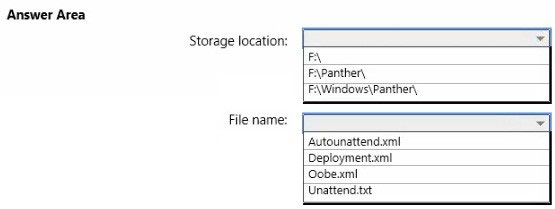
Answer :
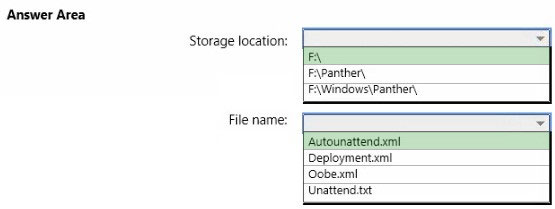
References:
https://technet.microsoft.com/en-gb/library/cc749415(v=ws.10).aspx

